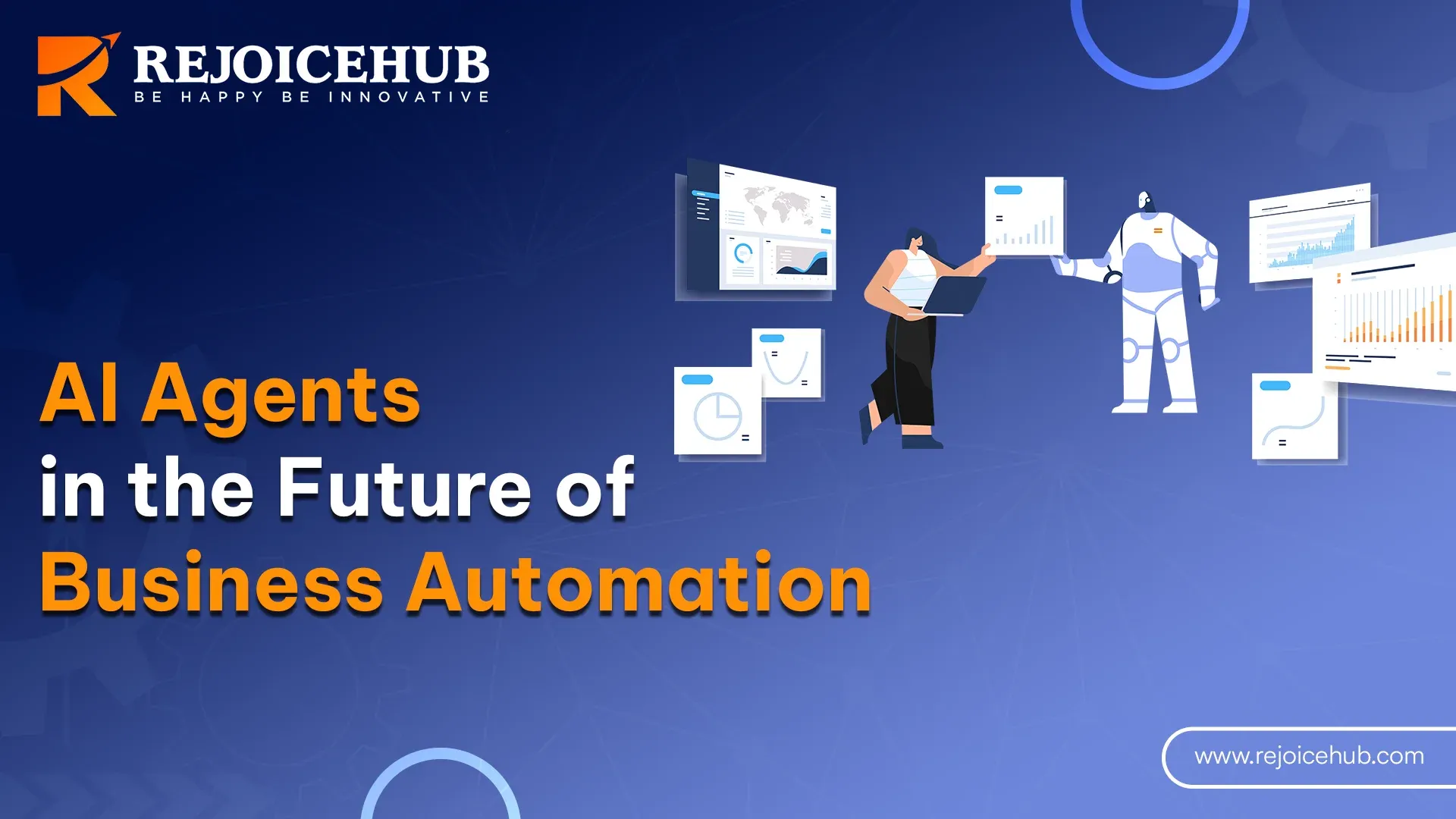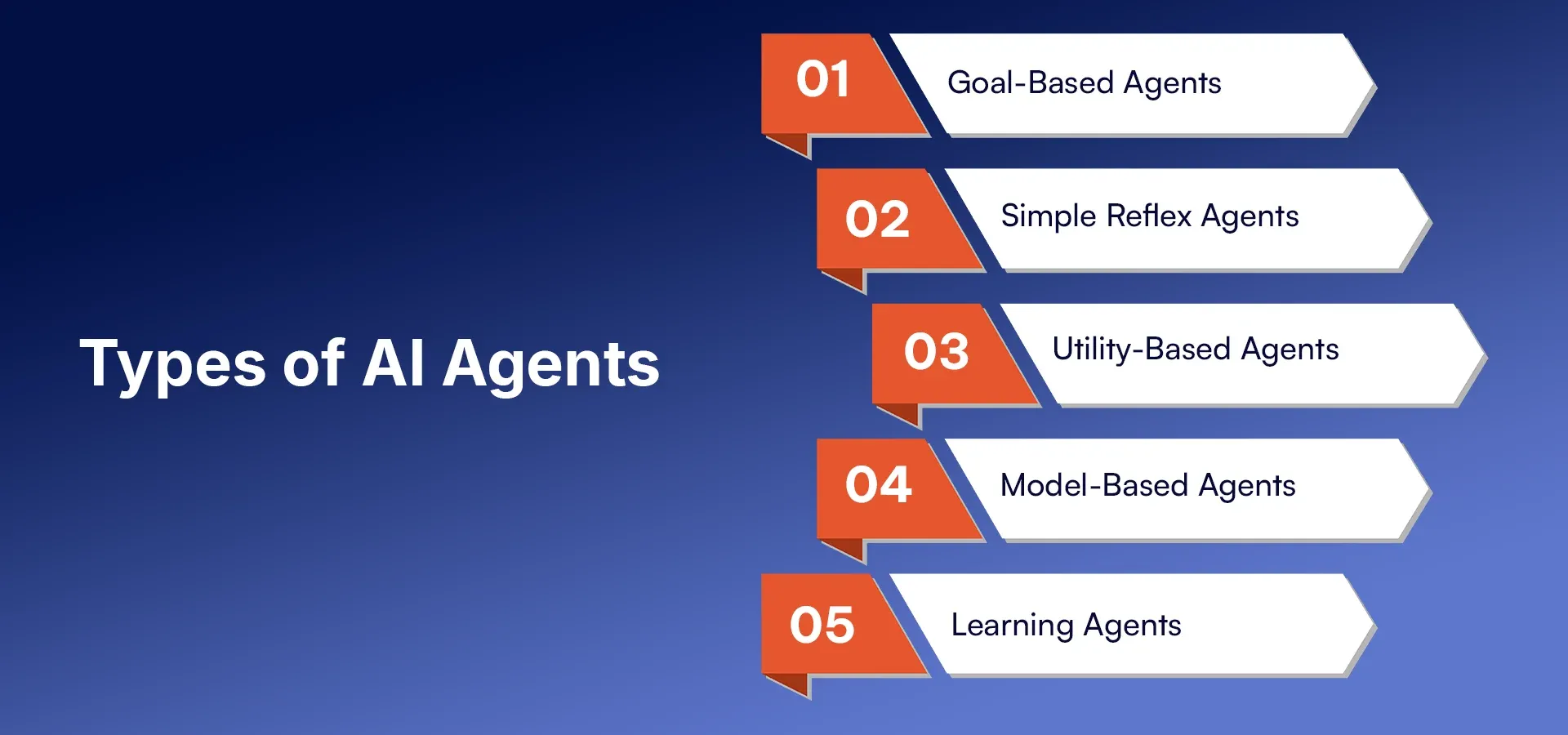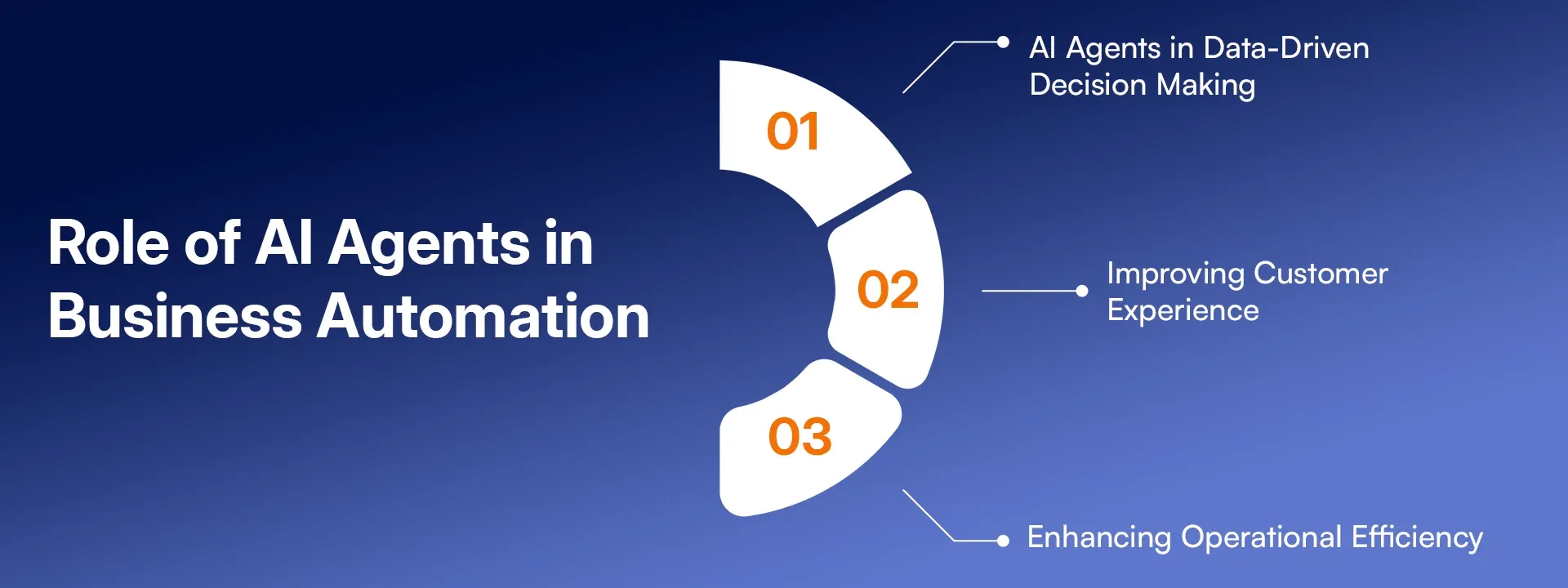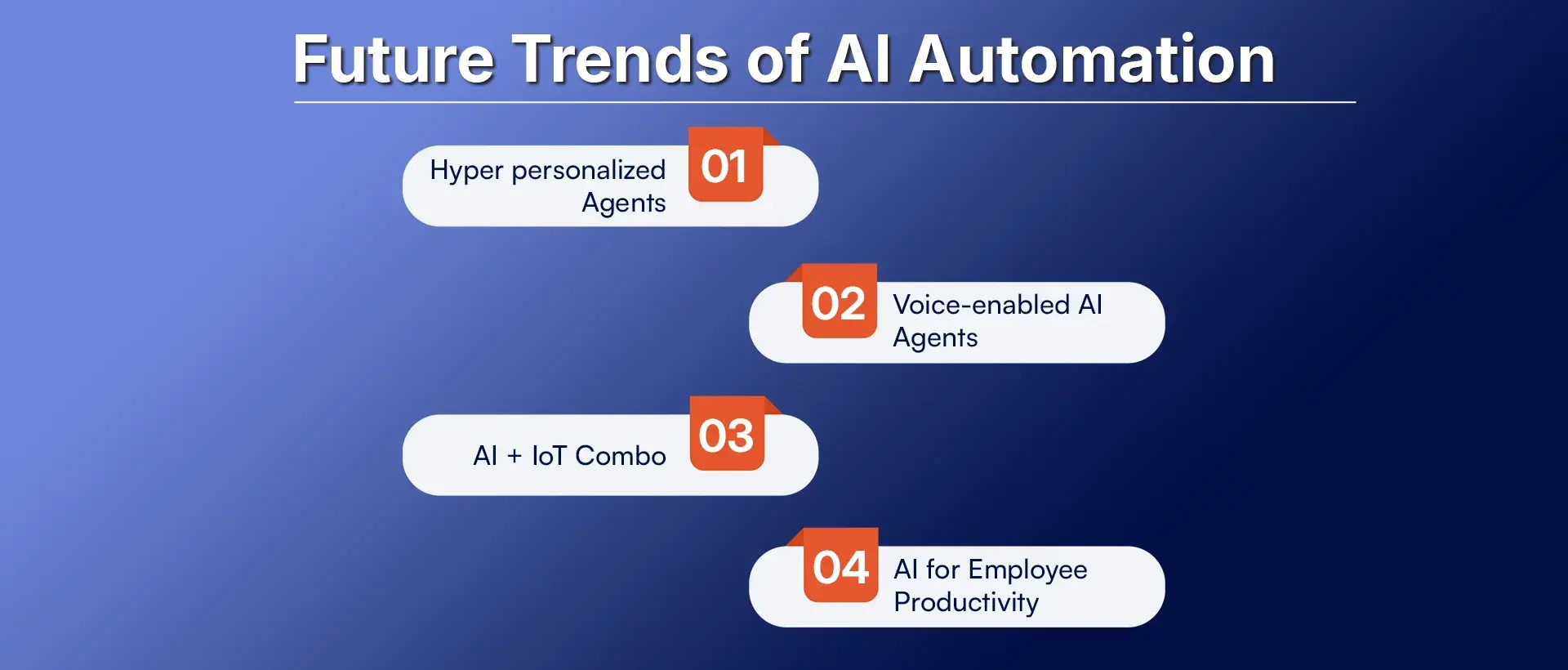
Remember that feeling when you first used Google Maps. It literally changed the way of doing things. That’s exactly what is happening right now with AI Agent Development Services in business. These digital workers are revolutionizing no cap. It is changing how companies operate. And most people don’t even realize it is happening.
AI agents are fundamentally changing the relationship between humans and work. They are taking boring and repetitive tasks that drain our energy. It gives us space to do the creative and strategic thinking that humans do best.
They answer basic customer questions and make complex supply chain decisions. These digital workers are getting and becoming important team members in businesses.
Quick Summary
-
AI agents are autonomous software programs. It can sense their environment and make decisions. It takes action to achieve specific goals.
-
Different types of AI agents (simple reflex, goal-based, utility-based, model-based and learning agents). They serve different business needs.
-
Key benefits include 24/7 operation, consistent performance, cost reduction and freeing human workers for higher-value tasks.
Keep reading to know everything in detail
What are AI Agents
AI agents are autonomous software programs. It is designed to perceive their digital environment. Along with that, they make decisions and take action. It is to accomplish specific goals. That is done with minimal human intervention. AI agents can adapt their behaviour. It is based on circumstances, learning from experience and sometimes even collaborating with other agents or humans.
AI agents operate within defined business parameters. But they have significant freedom. It is to determine the best approach. That is also within those boundaries. For example, a customer service AI agent might have access to a company's entire knowledge base. It even has the authority to resolve issues up to a certain dollar amount. But it would escalate more complex problems for human representatives.
These agents are moving from handling simple and rule-based tasks to managing complex workflows. It requires judgment and learning. It also requires adaptation. This is expanding their role in business automation across industries.
How do AI Agents work?
AI agents operate through a four-stage cycle. It does what humans do in decision-making but at machine speed and scale.
1. Perception
The agent gathers information. It is gathered from its environment through data input. This could be structured data (sales figures or inventory levels), unstructured data (customer emails or social media posts) or real-time signals from connected systems.
2. Processing
They use various AI technologies. It includes machine learning, natural language processing and knowledge representation. The agent analyzes the information to understand the current situation.
3. Decision Making
The agent selects the most appropriate action. That is from available options. It is based on its programming, goals and prior learning. This might involve complex calculations, predictive analytics or applying decision rules.
4. Action
The agent executes the chosen action. It could range from sending an automated response to a customer. It adjusts inventory levels by initiating a workflow. It even feeds information to another system.
This cycle repeats continuously with the agent. It learns from the outcomes of previous actions to improve future decisions. The specific technologies vary based on the agent's purpose. But often include:
- Natural Language Processing (NLP) for understanding and generating human language
- Machine Learning for pattern recognition and prediction
- Knowledge Graphs for representing relationships between information
- Decision Trees or Neural Networks for structured decision-making
- Integration APIs for connecting with existing business systems
The most advanced AI agents can operate across multiple systems. It handles complex workflows and collaborates with other agents. It is to solve problems that require different specializations. This creates an interconnected network of digital workers throughout an organization.
Types of AI Agents
AI agents are autonomous software systems designed to perceive their environment, make decisions, and take actions to achieve specific goals. They vary in complexity and functionality, and can be categorized based on their behavior and capabilities. Here's a concise overview of the main types of AI Agents:

1. Goal-Based Agents
These agents focus on achieving specific goals. If the goal is to increase sales, they will explore different strategies. Also, it will adapt until it hits the mark.
2. Simple Reflex Agents
These agents are rule-followers. They respond based on predefined conditions. They are not the smartest of the bunch but are very useful for simple tasks.
3. Utility-Based Agents
These agents calculate the best outcome. It is based on utility. It lets us feel like we are having a mini economist in the system. It figures out what is most valuable.
4. Model-Based Agents
These agents build a model of the world and base their decisions on current perceptions and past actions. They maintain an internal representation of their environment.
5. Learning Agents
These agents learn over time. Their every interaction teaches them something new. They start with basic knowledge. Then, they adapt and refine their approaches based on actions.
Also Read; What Are the Real-World Uses of AI Agents in Business
Key features of AI Agents
AI agents are intelligent software systems designed to autonomously perform tasks on behalf of users or other systems. They are increasingly integral to modern applications, from virtual assistants to enterprise automation. Here's a concise overview of their key features:

1. Decision Making
AI agents analyze large amounts of data, find patterns and make smart choices. They help businesses predict trends, reduce risks, and improve strategies based on real-time information.
2. Autonomy
AI agents work independently. It makes decisions without constant monitoring. They run operations nonstop. They manage tasks like scheduling maintenance. They adjust based on business needs by freeing humans. So that they can focus on bigger priorities.
3. Adaptability
AI agents learn from experience. They adjust to changes and improve over time. They recognize patterns, react to unexpected situations and optimize processes. This makes them more efficient as they keep getting useful.
Role of AI Agents in Business Automation
AI agents are transforming business automation by acting as intelligent, autonomous systems that perform tasks, make decisions, and collaborate with humans across various functions. Unlike traditional tools, these agents can adapt, learn from data, and operate with minimal human intervention, enhancing efficiency and productivity. BCG Global.

-
AI Agents in Data-Driven Decision Making
AI agents analyze large amounts of data, find patterns and make smart choices. They help businesses in predicting trends, reducing risks and improving strategies based on real time information.
-
Improving Customer Experience
AI agents assist customers by answering questions, solving problems and personalizing services. They provide quick responses that reduce wait times. They ensure a smooth experience that keeps customers satisfied.
-
Enhancing Operational Efficiency
AI agents simplify work by automating tasks, managing schedules and reducing errors. They improve productivity and cut costs. They keep businesses running smoothly. That also without needing constant human supervision.
What are the benefits of AI Agents for Business Automation
AI agents are transforming business automation by enhancing efficiency, reducing costs, and enabling smarter decision-making. Here's a concise overview of their key benefits:

-
Enhanced Decision Making
AI agents process vast amounts of data. They identify trends and make informed decisions. They improve business strategies, minimize risks and provide accurate insights. These organizations stay ahead in a competitive market.
-
Cost Reduction and Scalability
AI agents lower the costs by automating tasks. Along with that by reducing errors and minimizing human labor. They also help businesses grow. It is possible by handling more work without needing extra resources or staff.
-
Increased Efficiency and Productivity
AI agents simplify processes and speed up tasks. They help businesses to work faster by reducing delays and increasing productivity. They free up employees for more valuable and important work.
How to implement AI Agents in your Business
-
Pilot Low Risk Workflows
Start by testing AI agents in tasks that have minimal risks. This allows you to see their impact and make improvements. This makes sure that integration is smooth before expanding to critical processes.
-
Audit Repetitive Tasks
Identify routine tasks that take up time but require little creativity. AI agents can automate these processes. It reduces errors, improves efficiency, and frees employees to focus on work of higher value.
-
Use Trusted Tools
Select AI platforms that are reliable, secure and well-supported. Choosing proven tools makes sure that implementation is seamless and risk is minimized. It helps businesses maximize the benefits of automation.
Also Read: Best AI Agents for Business to Improve Productivity in 2025
How to implement AI Agents in your Business
Implementing AI agents in your business can significantly enhance efficiency, automate tasks, and provide strategic insights. Here's a concise overview to guide you through the process:

-
Pilot Low Risk Workflows
Start by testing AI agents in tasks that have minimal risks. This allows you to see their impact and make improvements. This makes sure that integration is smooth before expanding to critical processes.
-
Audit Repetitive Tasks
Identify routine tasks that take up time but require little creativity. AI agents can automate these processes. It reduces errors, improves efficiency and frees employees to focus on higher value work.
-
Use Trusted Tools
Select AI platforms that are reliable, secure and well supported. Choosing proven tools makes sure that implementation is seamless and risk is minimized. It helps businesses maximize the benefits of automation.
Future Trends of AI Automation

AI automation is rapidly transforming industries worldwide, and 2025 marks a pivotal year in this evolution. Here's a concise overview of the key trends shaping the future of AI automation:
-
Hyper personalized Agents:
AI agents learn everything about a business. It personalizes solutions to the needs. They provide smart insights, automate tasks and improve efficiency by adapting to unique workflows and goals.
-
Voice-enabled AI Agents
Businesses interact with AI using voice commands. Just like Alexa or Siri. These agents understand speech, follow instructions, and help users manage tasks hands-free for smoother operations.
-
AI + IoT Combo
AI agents connect with smart devices in factories and warehouses. They monitor equipment, optimize operations and predict issues. This keeps businesses running efficiently with real-time automation.
-
AI for Employee Productivity
AI agents organize work schedules. They suggest smart strategies and automate routine tasks. They help employees focus on important work, increase productivity and improve overall business performance. Businesses that invest in these trends early will have the edge.
Conclusion
AI agents are advanced, powerful, flexible, and fast growing. The need for intelligent automation grows stronger as business challenges get more complex. It handles things from smarter customer services to better decisions and massive cost savings. AI agents offer it all. But you need the right partner to make it work for your business needs.
That is why partnering with a trusted AI Agent Development Company like RejoiceHub can be helpful for the growth of your business. You can customize solutions and automate smarter with their specialized AI Agent Development Services.
Frequently Asked Questions
Are AI agents suitable for small businesses too?
Absolutely.
How long does it take to implement AI agents?
It depends on the complexity.
Do I need technical knowledge to use AI agents?
Not at all.
Can AI agents replace human employees?
No, they are here to support and not replace.
